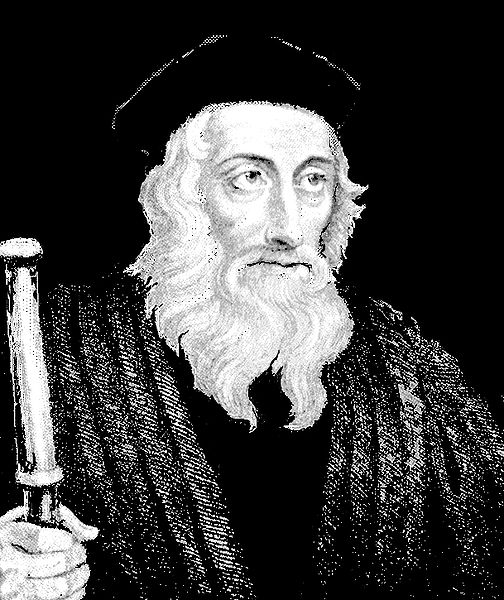 On Wed Nov 13 (2013), The History Channel began a six part series of 1-hour shows entitled Bible Secrets Revealed, with the first episode focused on Translation (click here to watch).
On Wed Nov 13 (2013), The History Channel began a six part series of 1-hour shows entitled Bible Secrets Revealed, with the first episode focused on Translation (click here to watch).
I finally watched my taped version yesterday.
I’ll start with the positive.
The historical section (2nd hour was the best part of the show) was great. They told the story of John Wycliffe (pictured on left) and William Tyndale, two radical English men who thought the Bible should be available, not just in Latin, but in English, so everyone could read it (assuming they could read English, that is). Spoiler alert: both were killed for doing something so radical. I will never take for granted the fact that I have easy access to the English Bible. Thanks, John and William.
It was good that the episode pointed up some of the textual problems that often get ignored. The end of Mark’s gospel (Mk. 16:9-20) and the story of the woman caught in adultery (John 7:53-8:11) aren’t in some of the oldest manuscripts (as your Bible should tell you in a footnote, if you’re Bible doesn’t, get a new one).
There are differing biblical perspectives on who killed Goliath (see 1 Sam. 17:51; 2 Sam. 21:19; 1 Chron. 20:5). Although, in their attempt to heighten the conflict, one scholar made a point about a supposed textual conflict with Goliath’s sword that was totally unconvincing.
So, it was good to observe those problems, but I had serious problems with how they interpreted the problems.
First, they made it seem like their conclusions are clear-cut, when they are not. Often these textual issues are highly complicated. I can understand The History Channel not wanting to go into all the complexity in a 60 minute episode for popular audiences, but what they did bordered on deception.
Second, the narrator frequently said “Scholars say…” (Wikipedia calls this using “weasel words“), and then they would quote one scholar who supposedly represented the academic perspective on that subject. But they didn’t include diverse opinions, just the ones who had the most un-traditional views on the Bible–the scholars who were trying to expose on those hidden secrets.
Third, I don’t know everyone who was interviewed, but when it came to the Bible, there weren’t any who were clearly arguing for an Evangelical perspective. I can think of dozens of solid, highly respected Old Testament scholars who could have done a great job of being articulate, but perhaps not as shockingly provocative.
Overall, I’m glad I watched and will continue watching, but as I tell my students, be critical.
If you watched it, what did you think?
